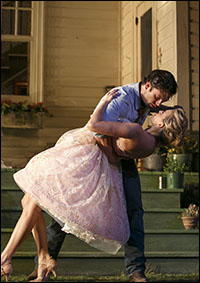
*
"Hello, young lovers, whoever you are…"
Broadway might well wonder this of the two 29-year-olds who got the star-crossed spot in the Roundabout revival of William Inge's Pulitzer Prize-winning Picnic.
But the rest of the world is pretty hip to Maggie Grace and Sebastian Stan. She was the spoiled heiress who sunbathed to excess among the plane-crash survivors on "Lost," and he spent 2012 alternating on the small screen as Jefferson the Mad Hatter on "Once Upon a Time" and Sigourney Weaver's son on "Political Animals."
Instantly — at the press meet-and-greet for the cast that director Sam Gold corralled for this revival, Elizabeth Marvel, Reed Birney, Mare Winningham and Ellen Burstyn among them — the pair, who play Madge Owens and Hal Carter, respectively, took center stage. Grace, in all her willowy blonde radiance, could only be the town beauty heading down the aisle with the local factory owner's son. Stan, in a beat-up brown leather jacket, is the scruffy, sexy drifter-dreamer who'll upend her life over one eventful Labor Day. Joshua Logan won a Tony directing Janice Rule and Ralph Meeker in the original 1953 play and an Oscar nomination directing Kim Novak and William Holden two years later in the movie version — and the rules of animal attraction were in full force when these two characters come together on a dance floor.
When they do come together, it's with very mixed baggage. College dropout Hal, banged up by the real world, has come to town to see if his fraternity brother Alan (Ben Rappaport) can fix him up at his father's factory — he unrealistically sees it as an executive position. Picture-pretty Madge has her problems too: a mother (Winningham) who sees beauty as a man-trapping device ("A pretty girl doesn't have long"); a sister (Madeleine Martin), younger and smarter, resentfully chanting "Madge is the pretty one!" Even Madge finds it wearisome, confiding to Hal,"I get so tired of just being told I'm pretty."
 |
||
| Sebastian Stan and Maggie Grace |
||
| Photo by Joan Marcus |
"I just loved that Sam was really keen to release this '50s idea of the vapid ingénue — that, perhaps, this young woman is really at a crux of her life as well. She has an inkling that maybe the life laid out for her isn't the best deal after all."
Stan sees Hal as a Brando-brand product of his times. "This is not Stanley Kowalski at all — it's not that kind of role — but it has rebellious qualities of all those guys from the '50s. Because William Inge and Tennessee Williams came out of the same frame of thought, they wrote these male characters who were sort of extremes — brooding, violent, broken, unpredictable — and this part has all those possibilities in it."
As Stan sees it, Hal's problem is that he's tired of the rebel stance and wants to sit down a while — if not at an executive level, at least at a level with everybody else.
"For him, he's so yearning to fit into this idea of a world he thinks he needs to be in that he ignores who he really is. He wants to be part of that so badly he doesn't pay attention to his own values. Once in a while, it takes a girl to remind you of those." These opposites attract, but will they stick in the long run? Stan opts for the soft focus: "I'm more of the romantic thought that they lived a life on the road — maybe not necessarily owning a lot but always in the quest for a new adventure. People today say, 'Oh, but what kind of life is that? She's going to get pregnant and live in a hotel room.' That's the brutal realism of today. It was more acceptable back then to have this romantic getaway lifestyle. People believed in those things, so — for the people who still think that way, I being one of them — I believe they'll be great."
Grace is less sure of that: "It depends on if you're asking Maggie or Madge," she says. "It's really good for me, as Madge, to fall in love for the first time every day for a few months, to have that kind of hope and believe in the best in someone. Of course, being a little more well-therapied and older than Madge, I look at it and go, 'Oh my God, these kids are so ill-equipped to build their relationship. They're both reeling from really dysfunctional childhoods and have no idea how to cobble together a life.'"
"Goodbye, young lovers, whoever you were…"
(This feature appears in the February 2013 issue of Playbill magazine.)

























